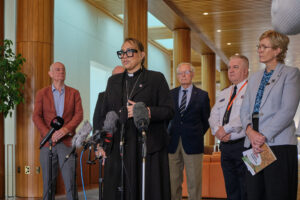How we’re building public and political support for Australian Aid.
The Safer World for All campaign – a joint initiative of Micah Australia, the Australian Council for International Development (ACFID), and Global Citizen – is a growing, multi-year effort to build broad public and political support for Australian aid to be restored to 1% of the Federal Budget. This report captures the campaign’s impact during a critical recent phase: the lead-up to the 2025 Federal Budget and Election.
Key Outcomes:
In an environment marked by global aid cutbacks, cost-of-living pressures, and rising defence spending, the campaign delivered a strategic mix of grassroots mobilisation, political engagement, and media activity that helped protect Australia’s aid budget and energised visible cross-partisan support for aid. It reinforced the message that aid is not only an expression of compassion—but a key pillar of national interest and regional leadership.
KEY OUTCOMES DURING THIS PHASE INCLUDED:
- Labor held the line on aid in the 2025 Federal Budget, increasing funding to $5.1 billion—a $135.8 million nominal increase (though aid remains at 0.65% of the Federal Budget)
- 63 federal MPs & Senators met with directly
- 7 candidate forums reaching 12 battleground seats with diaspora and community leaders
- 875 women mobilised through the Micah Women’s Network Tour across 8 capital cities
- Over 3,300 constituents directly emailed their MPs
- Widespread national media coverage
- Joint letter released from national Church leaders
- Backbench Coalition MPs publicly called on their party to protect aid
- Several Teal Independents explicitly backed the campaign’s call for 1%
- The Greens maintained a policy position that goes even further than the campaign’s core ask
Campaign Activities:
Micah Women’s Network Canberra Delegation:
Senior Christian women leaders met with 44 federal MPs to build cross-partisan support for aid, including: Minister Penny Wong, Minister Pat Conroy, Shadow Minister Jane Hume, Shadow Minister Michael McCormack, Senator Matt Canavan, Senator David Pocock.


Electorate Lobbying:
In key electorates nationwide, church and community leaders met directly with 14 federal MPs to advocate for aid, including: Jim Chalmers (Rankin, QLD), Tony Pasin (Barker, SA), Sophie Scamps (Mackellar, NSW), Henry Pike (Bowman, QLD), Monique Ryan (Kooyong, VIC), Josh Wilson (Fremantle, WA).


Heads of Churches Joint Letter:
The ten heads of Australia’s mainline churches signed a unified letter to political leaders calling for the protection and restoration of aid to 1% of the Federal Budget. The letter was strategically shared with key Ministers and Shadow Ministers before being made public, reinforcing the campaign’s call with high- level moral authority at a crucial moment in budget decision-making.
Pre-Budget Media Push:
A joint press conference—featuring Admiral Chris Barrie, Rev Charissa Suli, Zali Steggall MP,
and Tim Costello—highlighted the growing gap between aid and defence spending. Backed by the ANU Development Policy Centre, it secured national coverage across ABC, SBS, The Guardian and The Australian.


Digital Mobilisation:
Over 3,300 personalised emails sent to MPs by local constituents. Caused MPs like Allegra Spender MP to personally write to the Minister for International Development in response to constituent outreach.
Devpolicy Talks Podcast Series:
In collaboration with ANU, ACFID, IDCC and SWFA, this election special featured party spokespeople on aid outlining their policy positions:
• Pat Conroy MP (Labor)
• Senator Mehreen Faruqi (Greens)
• Zali Steggall MP (Independent)
• Michael McCormack MP (Coalition – declined)
Minister Conroy’s episode offered the most detailed aid policy comments by a government minister during the election campaign.
ELECTORATE FORUMS:
The campaign hosted seven candidate forums reaching 12 marginal and symbolically important seats. These events brought together diaspora leaders, community groups, and political candidates to elevate aid as a voter- relevant issue to party headquarters. Several forums featured candidates who went on to win maiden victories, helping build early relationships and future pathways for engagement.







MICAH WOMEN’S NETWORK TOUR
875 women mobilised across 8 capital cities to engage with MPs and champion aid. Each event equipped participants as advocates in their local electorates – amplifying the political relevance of women’s voices for aid.
Events took place in these cities with the following MPs as guest speakers:

KEY MEDIA PIECES
- SMH/Age – The number in the federal budget most Australians get wrong
- The Guardian – Liberal backbenchers urge Coalition not to raid foreign aid budget to pay for rumoured $15bn defence boost
- APP – Crossbench calls for aid lift in face of meagre pledges
- ABC Radio National – Calls to boost foreign aid as report lays bare defence spending
- SMH/Age (Op-ed Tim Costello) – I’ve seen the impact of Trump and Musk’s on USAID
- ABC – Federal budget redirects aid spending to Pacific, South-East Asia as region braces for Trump administration cuts

APPENDIX: Photos from Constituent Meetings

















